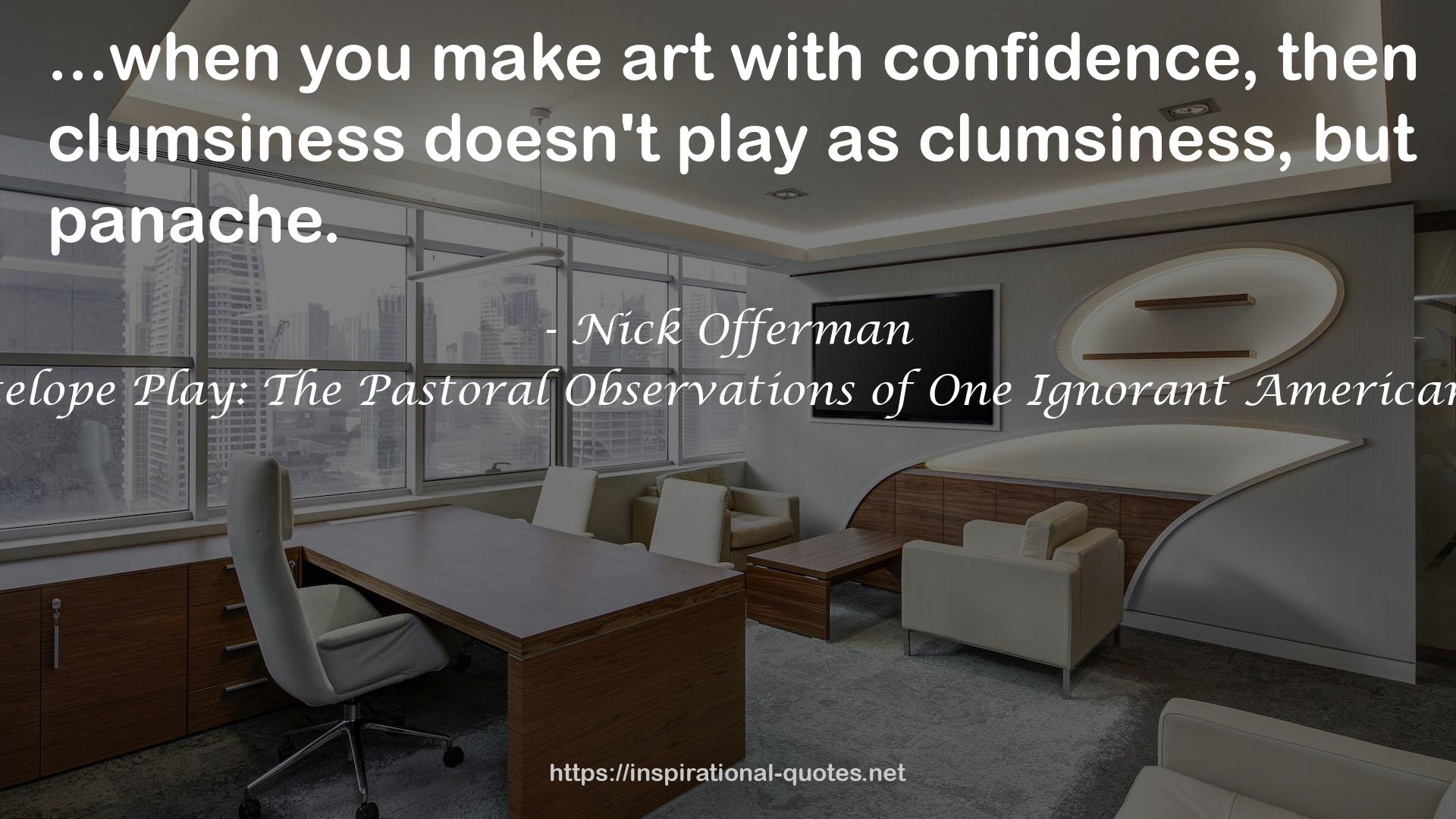3
" Mother Nature is not an American, and she is not proud. She is all creation, so her vibe encompasses all experience, in every size, shape, and color, from the high to the low. Her economy and it's successful evolution thrive on diversity, and her children never rest in their glorious participation, reproducing and adapting, so as to grow ever stronger. "
― Nick Offerman , Where the Deer and the Antelope Play: The Pastoral Observations of One Ignorant American Who Loves to Walk Outside
10
" We must understand that each and every one of us is a cog or a wheel in the ecosystem of Leopold's parlance, and that like it or not, you need me. And I need you, every gorgeous, goddamn one of you, to continue to engender the ethics of agrarianism throughout the world, to save our food systems, our farmers, our civilizations, and ultimately ourselves. It's the biggest no-brainer in the history of mankind. "
― Nick Offerman , Where the Deer and the Antelope Play: The Pastoral Observations of One Ignorant American Who Loves to Walk Outside
14
" We had climate change, we had Black people being murdered by police officers, we had our usual national menu of violence against women, we had all kinds of discrimination happening, and if you're still here with me for part 3, then you know the list: all the societal evils that blossom at the bottom of the barrel in a population and fester and spread the cankers of hate and fear and greed. The qualities in humanity against which some of us strive to progress, and thereby improve, in the hopes that one day nobody will have to endure being systemically shat upon. Accordingly, and accurately, this relative stance causes us to be labeled "progressives," but it doesn't stop at that, apparently. We are also radical, socialist, communist, Marxist, leftist libtards whom our detractors love to see cry. "
― Nick Offerman , Where the Deer and the Antelope Play: The Pastoral Observations of One Ignorant American Who Loves to Walk Outside
17
" propose that we consider our farmers on a spectrum, let’s say, of agrarianism. On one end of the spectrum we have farmers like James, interested in producing the finest foodstuffs that they can, given the soil, the climate, the water, the budget, and their talent. They observe how efficacious or not their efforts are proving, and they adapt accordingly. Variety is one of the keys to this technique, eschewing the corporate monocultures for a revolving set of plants and animals, again, to mimic what was already happening on the land before we showed up with our earth-shaving machinery. It’s tough as hell, and in many cases impossible, to farm this way and earn enough profit to keep your bills paid and your family fed, but these farmers do exist. On the other end of the spectrum is full-speed-ahead robo-farming, in which the farmer is following the instructions of the corporation to produce not food but commodities in such a way that the corporation sits poised to make the maximum financial profit. Now, this is the part that has always fascinated me about us as a population: This kind of farmer is doing all they can to make their factory quota for the company, of grain, or meat, or what have you, despite their soil, climate, water, budget, or talent. It only stands to reason that this methodology is the very definition of unsustainable. Clearly, this is an oversimplification of an issue that requires as much of my refrain (nuance!) as any other human endeavor, but the broad strokes are hard to refute. The first farmer is doing their best to work with nature. The second farmer is doing their best despite nature. In order for the second farmer to prosper, they must defeat nature. A great example of this is the factory farming of beef/pork/chicken/eggs/turkey/salmon/etc. The manufacturers of these products have done everything they can to take the process out of nature entirely and hide it in a shed, where every step of the production has been engineered to make a profit; to excel at quantity. I know you’re a little bit ahead of me here, but I’ll go ahead and ask the obvious question: What of quality? If you’re willing to degrade these many lives with impunity—the lives of the animals themselves, the workers “growing” them, the neighbors having to suffer the voluminous poisons being pumped into the ecosystem/watershed, and the humans consuming your products—then what are you about? Can that even be considered farming? Again, I’m asking this of us. Of you and me, because what I have just described is the way a lot of our food is produced right now, in the system that we all support with our dollars. How did we get here, in both the US and the UK? How can we change our national stance toward agriculture to accommodate more middle-size farmers and less factory farms? How would Aldo Leopold feel about it? "
― Nick Offerman , Where the Deer and the Antelope Play: The Pastoral Observations of One Ignorant American Who Loves to Walk Outside
 Where the Deer and the Antelope Play: The Pastoral Observations of One Ignorant American Who Loves to Walk Outside
Where the Deer and the Antelope Play: The Pastoral Observations of One Ignorant American Who Loves to Walk Outside